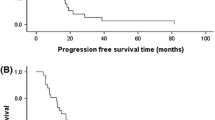Abstract
The selection of chemotherapeutic regimens is challenging for metastatic breast cancer (MBC) patients whose diseases have failed to respond to anthracyline and taxane. Capecitabine has advantages of oral administration and favorable toxicity profiles. This study was conducted to evaluate the efficacy of capecitabine and to identify the subgroup of patients who would potentially have benefit from capecitabine monotherapy in patients with anthracycline- and taxane-pretreated MBC. Female patients with MBC who had been previously treated with anthracycline and taxane received oral capecitabine 2500 mg/m2 divided in two doses daily for 2 wk with 1-wk rest period. Between September, 1999, and December, 2002, a total of 38 patients were enrolled. Among the 36 evaluable patients, one patient achieved a complete response (CR), 9 patients had partial responses (PRs), and 13 patients had stable diseases (SDs). Response rate was 26% [95% confidence interval (CI), 12–40%] and the tumor control rate (TCR, CR+PR+SD) was 61% (95% CI, 45–77%). The median follow-up duration was 27.8 mo. The median duration of response was 8.9 mo, the median time to progression was 4.6 mo, and the median overall survival was 18.1 mo. The major toxicities were hand-foot syndrome, diarrhea, and emesis. There was no treatment-related death. The predictors of better overall survival were positivity of hormone receptor, disease-free survival longer than 1 yr, non-refractoriness to anthracycline, and fewer number (≤3) of involved organs. Capecitabine monotherapy is effective and well tolerated for MBC patients who had previously been treated with anthracycline and taxane. The TCR could predict overall survival as well as the objective respose in this study, suggesting a possible role of TCR as a surrogate marker for survival in MBC patients on salvage chemotherapy. The patients who have relatively slow growing tumor and less tumor burden could have benefit from capecitabine monotherapy following anthracycline- and taxane-based chemotherapy.
Similar content being viewed by others
References
Winer EP, Morrow M, Osborne CK, Harris JR. Malignant tumors of the breast. In: DeVita VT Jr., Hellman S, Rosenberg SA (eds). Cancer: Principles and Practice of Oncology. 6th ed. Lippincott Williams and Wilkins: Philadelphia, 2001, pp. 1651–1717.
Norton L. Salvage chemotherapy of breast cancer. Semin Oncol 1994; 21:19–24.
Fossati R, et al. Cytotoxic and hormonal treatment for metastatic breast cancer: a systematic review of published randomized trials involving 31,510 women. J Clin Oncol 1998; 16:3439–3460.
A’Hern RP, Smith IE, Ebbs SR. Chemotherapy and survival in advanced breast cancer: the inclusion of doxorubicin in Cooper type regimens. Br J Cancer 1993; 67:801–805.
Nabholtz JM, et al. Prospective randomized trial of docetaxel versus mitomycin plus vinblastine in patients with metastatic breast cancer progressing despite previous anthracycline-containing chemotherapy: 304 Study Group. J Clin Oncol 1999; 17:1413–1424.
Chan S, et al. Prospective randomized trial of docetaxel versus doxorubicin in patients with metastatic breast cancer. The 303 Study Group. J Clin Oncol 1999, 17:2341–2354.
Seidman AD. Monotherapy options in the management of metastatic breast cancer. Semin Oncol 2003; 30:6–10.
Crown J, et al. Chemotherapy for metastatic breast cancer-report of a European expert panel. Lancet Oncol 2002; 3:719–727.
Blum JL, et al. Multicenter phase II study of capecitabine in paclitaxel-refractory metastatic breast cancer. J Clin Oncol 1999; 17:485–493.
Blum JL, et al. Multicenter, phase II study of capecitabine in taxane-pretreated metastatic breast carcinoma patients. Cancer 2001; 92:1759–1768.
Reichardt P, et al. Multicenter phase II study of oral capecitabine (Xeloda®) in patients with metastatic breast cancer relapsing after treatment with a taxane-containing therapy. Ann Oncol 2003; 14:1227–1233.
NCI/CTC Web site: http://ctep.info.nih.gov.
Fazeny B, et al. Vinorelbine-induced neurotoxicity in patients with advanced breast cancer pretreated with paclitaxel—a phase II study. Cancer Chemother Pharmacol 1996; 39:150–156.
Livingston RB, et al. Dose-intensive vinorelbine with concurrent granulocyte colony-stimulating factor support in paclitaxel-refractory metastatic breast cancer. J Clin Oncol 1997; 15:1395–1400.
Zelek L, et al. Weekly vinorelbine is an effective palliative regimen after failure with anthracyclines and taxanes in metastatic breast cancer carcinoma. Cancer 2001; 92:2267–2272.
Smorenburg C, et al. Phase II study of weekly gemcitabine in patients with metastatic breast cancer relapsing or failing both an anthracycline and a taxane. Breast Cancer Res Treat 2001; 66:83–87.
Valerio MR, et al. Gemcitabine in pretreated breast cancer. Proc Am Soc Clin Oncol 2001; 20: 51b (Abstr 1953).
Rha SY, et al. Efficacy of gemcitabine as a salvage treatment in breast cancer patients refractory to anthracycline and paclitaxel based regimen. Proc Am Soc Clin Oncol 2002; 21:57b (Abstr 2038).
Liu G, et al. Patient preferences for oral versus intravenous palliative chemotherapy. J Clin Oncol 1997; 15:110–115.
Author information
Authors and Affiliations
Corresponding author
Rights and permissions
About this article
Cite this article
Lee, SH., Lee, J., Park, J. et al. Capecitabine monotherapy in patients with anthracycline-and taxane-pretreated metastatic breast cancer. Med Oncol 21, 223–231 (2004). https://doi.org/10.1385/MO:21:3:223
Received:
Accepted:
Issue Date:
DOI: https://doi.org/10.1385/MO:21:3:223




